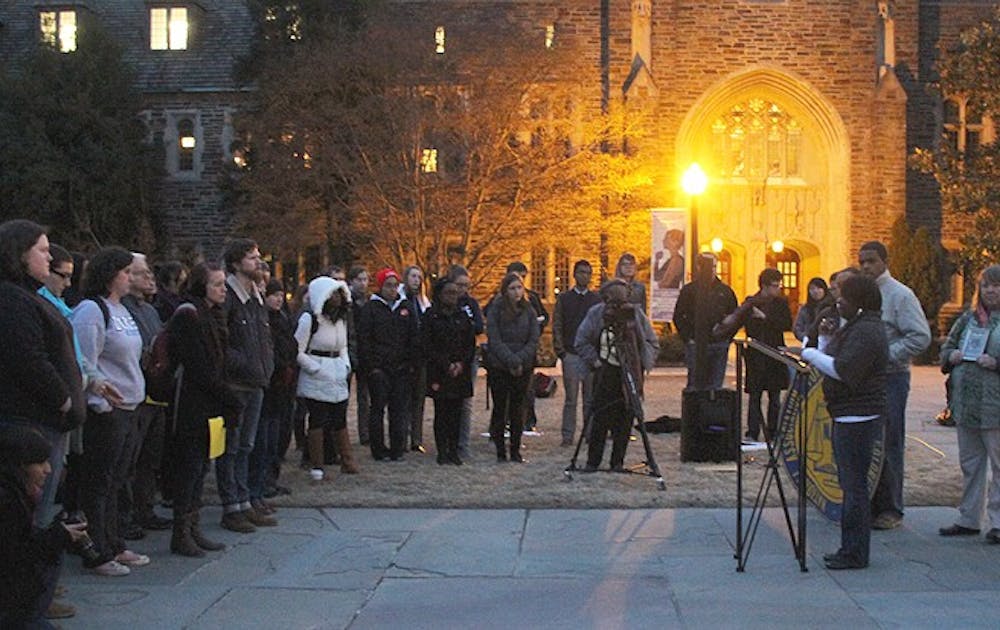Students and community activists met Monday night to oppose the passing of Senate Bill 4, which would deny federal funding to expand Medicaid to over 500,000 North Carolinians not covered in the current plan.
Duke Democrats, Blue Devils United, Duke SDS and the Duke chapter of the NAACP collaborated with the health care advocacy organizations to hold a vigil for those without medical insurance who have died from mistreatment. Speakers gave personal accounts of the effects of the current insurance and Medicaid system, rallying the crowd to contact the governor and aid local organizations. The evening culminated in the lighting of candles for those who died and those who cannot afford medical care.
The bill in question was drafted in response to the Affordable Care Act, which offers to subsidize the full cost and, later, 90 percent of additional costs that states take on to insure those with incomes at or below 133 percent of the poverty line. Currently, Medicaid in North Carolina is available to adults with dependents who make less than 49 percent of the poverty line. The bill—which would prevent the expansion of Medicaid eligibility required for the federal funds—has already passed in the Senate and the House and is awaiting approval by Gov. Pat McCrory, who has expressed support for the bill.
“Either people don’t know, or worse, they don’t care,” said Reverend William Barber, II, president of the North Carolina chapter of the NAACP.
Leading the speeches, Barber emphasized the Christian morals of giving to the poor and noted how current government actions do not adequately reflect this. Other speeches also addressed economic issues. Charles van Der Horst, Trinity ’74 and associate chief at the division of infectious diseases at the University of North Carolina at Chapel Hill, emphasized that switching to the new system would create jobs and cut the cost of medical care, especially in light of the federal subsidy.
“[The bill] is baffling—it’s not just mean-spirited but dumb,” van der Horst said, expressing a sentiment that was repeated throughout the evening.
The program also featured testimonials from those without insurance due to pre-existing conditions, travelling from as far as Asheville to tell stories of mistreatment and helplessness—ranging from skipped fibromyalgia medication to untreated tumors. In both testimonials, speakers noted how the Duke Hospital provided charity aid as a means of support.
Speakers also encouraged supporters to call McCrory and speak out against the bill using talking points from the vigil, in hopes that the governor will follow fellow Republican governors in accepting the health care initiative and vetoing the bill. Members of the audience rallied and repeated the message, one urging to “call every day.”
The event finished with the crowd forming a circle to watch the lighting of the five large candles for those who have died and those who cannot afford medical care. Candles were then distributed to all attendees in a moment of silence, which was followed by a communal singing of “We Shall Overcome.”
Beyond encouraging action against the bill, speakers also encouraged the crowd to volunteer at local health care organizations.
“Whether or not [the bill] passes, health care is still an issue, and there are many organizations who want to give help,” said senior Elena Botella, an organizer of the event.
Botella also writes a column for The Chronicle.
Organizers made reference to organizations such as Project Access for students to help the local poor receive health care.
The event was an example of “physical activism—a tangible opportunity to rally,” said sophomore Adrienne Harreveld, event organizer and co-president of Duke Democrats.
This sentiment was noted by other attendees of the event.
“Stats are one thing,” said sophomore Diego Quezada. “Human stories are another.”
Get The Chronicle straight to your inbox
Signup for our weekly newsletter. Cancel at any time.

